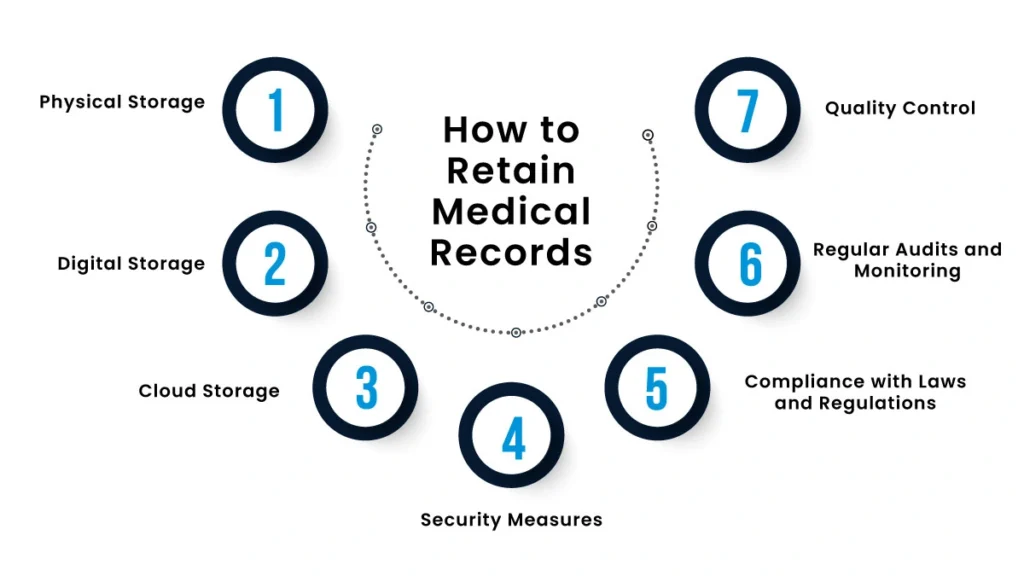
All You Need to Know About Healthcare Supply Chain
All You Need to Know About Healthcare Supply Chain The healthcare supply chain, the complex network behind delivering medications, equipment, and other essentials to patients,

After the post-pandemic era, where an increase in patient telehealth services was seen, the importance of medical records was highlighted even more. Medical records are an essential part of the healthcare system as they provide a comprehensive history of a patient’s health and treatment. This makes it crucial for providers and patients to understand how long medical records are kept.
In this blog, we will discuss the duration of how long are medical records kept and why it is crucial to maintain them. Just keep reading till the end to gain a better understanding of this topic.
Medical records are kept for various reasons, but the primary purpose is to ensure quality healthcare for patients. They provide a detailed history of a patient’s health, including any past illnesses, treatments, and medications. This information helps providers make informed decisions about patients’ current and future healthcare needs.
Moreover, medical records also serve as legal documents in case of any malpractice lawsuits. They provide evidence of the care provided to a patient, which can be used to support or defend claims made against a provider.
The duration of medical records retention is governed by individual states. According to HIPPA rule, For Medicare Fee For Service Providers, medical records must be kept for at least 6 years from the last service provided.
For providers who are submitting the cost reports should attain the medical records for a minimum of years from the date of submission of the cost report, and for those providers who are under the Medicare managed care program, medical records must be kept for 10 years.
As mentioned earlier, the duration of medical records retention varies from state to state. it differs for both individual doctors and hospitals. Below, we are going to discuss the duration for which medical records are kept in some of the states.
Alabama: For doctors, the medical records must be kept until the patient is under any medical treatment or for any medical purposes. For hospital the state law recommends a minimum of 5 years record retention period.
Alaska: Doctors in Alaska have no specific state requirements for the retention of medical records. Hospitals, however, must retain records for a minimum of 7 years after discharge unless the patient is a minor; in that case, records should be kept until the patient is 21 years old or for the 7-year period, whichever is longer.
Arizona: In Arizona, doctors must keep medical records for at least 6 years after the last service provided unless the patient is a minor. For minors, records must be retained until the patient is 21 years old or for a 6-year period, whichever is longer. Hospitals are held to the same standards as doctors in terms of record retention.
Arkansas: There is no state requirement for doctors in Arkansas regarding the retention of medical records. Hospitals, however, must keep the records for a minimum of 10 years after the last discharge unless the patient is a minor. If the patient is a minor, the records should be kept until the patient is 20 years old. Additionally, patient index data is kept permanently.
California: Doctors in California are not bound by state requirements for keeping medical records. For hospitals, the records should be kept for a minimum of 7 years after discharge unless the patient is a minor. In the case of minors, the records must be retained until the patient is 19 years old or for the 7-year period, whichever is longer.
Colorado: There are no specific requirements for doctors in Colorado regarding medical record retention. Hospitals must keep records for a minimum of 10 years after the patient’s last discharge unless the patient is a minor. In such cases, records must be retained until the patient is 28 years old.
Connecticut: Doctors in Connecticut must keep records for a minimum of 7 years from the last treatment or 3 years after the death of the patient. Hospitals are required to retain records for at least 10 years after discharge.
Delaware: Doctors in Delaware must retain records for a minimum of 7 years from the last record entry. There is no state requirement for hospitals regarding the retention of medical records.
District of Columbia: For doctors, records must be retained for a minimum of 3 years after the patient’s last visit unless the patient is a minor. In that case, records should be kept either for 3 years or until the patient is 21 years old. Hospitals must retain records for a minimum of 10 years after discharge.
Florida: Doctors in Florida are required to retain medical records for at least 5 years from the last visit. Hospitals, on the other hand, must keep records for a minimum of 7 years after the last entry for public hospitals.
Georgia: In Georgia, doctors must retain records for a minimum of 10 years from the creation of the record. Hospitals must follow the same duration unless the patient is a minor, in which case the records should be kept until the patient is 23 years old.
Hawaii: Doctors must keep full medical records for a minimum of 7 years after the last data entry, but basic information is to be kept for 25 years after the last data entry unless the patient is a minor. For minors, full medical records are to be retained until the patient is 25 years old and basic information until the patient is 43 years old. Hospitals are bound by the same rules as doctors for record retention.
Idaho: There are no state requirements for doctors in Idaho regarding the retention of medical records. Clinical lab tests and reports are to be kept by hospitals for a minimum of 5 years after the test.
Illinois: Doctors in Illinois must retain medical records for a minimum of 5 years after the record’s creation unless the patient is a minor, in which case records are to be kept until the patient is 21 years old or the 5-year period if that is longer. Hospitals have a similar requirement.
Indiana: Both doctors and hospitals in Indiana are required to retain medical records for a minimum of 7 years.
Iowa: Doctors must keep records for a minimum of 7 years after the last service unless the patient is a minor, with records retained until the patient is 19 years old. Hospitals in Iowa have no state requirement for record retention.
Kansas: Doctors must keep records for a minimum of 10 years from the last service. Hospitals must retain full records for at least 10 years after discharge unless the patient is a minor, in which case records are kept until the patient is 19 years old or the 10-year period if that is longer. Summaries of records are kept for a 25-year period.
Kentucky: There is no state requirement for doctors in Kentucky regarding medical record retention. Hospitals must retain records for a minimum of 6 years after discharge unless the patient is a minor, in which case records are kept until the patient is 21 years old or the 6-year period if that is longer.
Louisiana: Doctors must retain records for at least 6 years after the last treatment. Hospitals are required to keep records for a minimum of 10 years after discharge.
Maine: There is no requirement for doctors in Maine concerning medical record retention. However, hospitals must keep records for a minimum of 7 years unless the patient is a minor, in which case records are retained until the patient is 24 years old. Written x-ray reports and logs are kept indefinitely.
Maryland: Both doctors and hospitals in Maryland are required to keep records for a minimum of 5 years after the record’s creation unless the patient is a minor, in which case records are kept until the patient is 21 years old or the 5-year period if that is longer.
Massachusetts: Doctors must retain records until the patient is a minor, in which case records are kept until the patient is 18 years old or for a 7-year period if that is longer. Hospitals must retain records for a minimum of 30 years after discharge or final treatment.
Michigan: Medical records must be retained by doctors for a minimum of 7 years from the last service. Hospitals are required to follow the same time frame.
Minnesota: There is no state requirement for doctors in Minnesota regarding the retention of medical records. Hospitals must keep most medical records permanently, with miscellaneous documents kept for a minimum of 7 years unless the patient is a minor, in which case documents are kept until the patient is 25 years old.
Mississippi: Doctors in Mississippi are not required to adhere to any state requirements for record retention. Hospitals must retain records for a minimum of 10 years after discharge in sound mind and 7 years after discharge at death unless the patient is a minor, in which case records are kept until the patient is 25 years old.
Missouri: Doctors must retain records for a minimum of 7 years from the last service. Hospitals have a similar requirement unless the patient is a minor, in which case records are kept until the patient is 23 years old or the 10-year period if that is longer.
Montana: There is no state requirement for doctors in Montana concerning the retention of medical records. Hospitals must retain records for a minimum of 10 years unless the patient is a minor, in which case records are kept until the patient is 28 years old.
Nebraska: Doctors in Nebraska are not subject to state requirements for medical record retention. Hospitals must retain records for a minimum of 10 years after discharge unless the patient is a minor (under 19), in which case records are kept until the patient is 22 years old or the 10-year period if that is longer.
Nevada: Doctors must retain medical records for a minimum of 5 years after the creation of the record. Hospitals are held to the same 5-year retention period after the creation of the record.
New Hampshire: Doctors are required to keep records for a minimum of 7 years after the last contact with the patient unless records were transferred to a different provider. Hospitals must retain records for 7 years after discharge unless the patient is a minor, in which case they are kept until the patient is 19 years old or the 7-year period if that is longer.
New Jersey: Medical records in a doctor’s office must be retained for a minimum of 7 years from the last record entry. Hospitals must keep records for a minimum of 10 years after the last discharge unless the patient is a minor. For minors, records are kept until the patient is 23 years old or the 10-year period if that is longer. Additionally, discharge summary sheets must be kept for 20 years after discharge.
New Mexico: Doctors are required to keep records for a minimum of 10 years after the last treatment. Hospitals have the same retention period unless the patient is a minor, in which case records are kept until the patient is 19 years old.
New York: Doctors must keep records for a minimum of 6 years unless the patient is a minor, in which case they are kept until the patient is 19 years old or the 6-year period if that is longer. Hospitals are subject to the same retention requirements.
North Carolina: There is no state requirement for doctors regarding medical record retention. Hospitals must retain records for a minimum of 11 years after discharge unless the patient is a minor, in which case records are kept until the patient is 30 years old.
North Dakota: There is no state requirement for doctors concerning the retention of medical records. Hospitals must keep records for a minimum of 10 years after the last care or visit unless the patient is a minor, in which case the records are kept until the patient is 20 years old or the 10-year period if that is longer.
Ohio: Doctors are required to retain records for a minimum of 6 years. Hospitals must keep records for a minimum of 5 years after the patient’s last visit unless the patient is a minor, in which case the records are kept until the patient is 21 years old. Records are also kept 3 years after the patient’s death.
Oklahoma: There is no state requirement for doctors in Oklahoma regarding the retention of medical records. Hospitals must keep records for a minimum of 10 years after discharge, and the master patient index is kept indefinitely.
Oregon: There is no state requirement for doctors regarding medical record retention. Hospitals must retain records for a minimum of 10 years after discharge.
Pennsylvania: Doctors must keep records for a minimum of 7 years after the last service unless the patient is a minor, in which case records are kept until the patient is 22 years old or the 7-year period if that is longer. Hospitals are subject to the same retention requirements.
Rhode Island: Doctors must retain records for a minimum of 5 years unless certain laws or regulations say otherwise. Hospitals must retain records for a minimum of 5 years after the last discharge unless the patient is a minor, in which case records are kept until the patient is 23 years old.
South Carolina: Doctors must retain records for a minimum of 10 years after the last treatment unless the patient is a minor, in which case it is 13 years after the last treatment. Hospitals must keep records for a minimum of 10 years unless the patient is a minor, in which case records are kept until the patient is 19 years old.
South Dakota: Doctors must retain records for a minimum of 10 years when records are inactive or the physician does not know the whereabouts of the patient. Hospitals have the same requirement unless the patient is a minor, in which case records are kept until the patient is 20 years old or the 10-year period if that is longer.
Tennessee: Doctors must keep records for a minimum of 10 years after the last contact unless the patient is a minor, in which case records are kept until the patient is 19 years old or the 10-year period if that is longer. Hospitals have the same requirement.
Texas: Doctors must retain records for a minimum of 7 years from the last treatment unless the patient is a minor, in which case records are kept until the patient is 21 years old or the 7-year period if that is longer. Hospitals are subject to the same retention requirements.
Utah: There is no state requirement for doctors in Utah concerning the retention of medical records. Hospitals must keep records for a minimum of 7 years after the last treatment unless the patient is a minor, in which case records are kept until the patient is 22 years old or the 7-year period if that is longer.
Vermont: Doctors must retain records for a minimum of 6 years after the last patient contact unless the patient is a minor, in which case records are kept until the patient is 18 years old (or is emancipated) or the 6-year period if that is longer. Hospitals must keep records for a minimum of 10 years after discharge.
Virginia: Both doctors and hospitals in Virginia are required to retain records for a minimum of 6 years after the last contact unless the patient is a minor, in which case records are kept until the patient is 23 years old.
Washington: There is no state requirement for doctors in Washington regarding the retention of medical records. Hospitals must keep records for a minimum of 10 years after discharge unless the patient is a minor, in which case records are kept until the patient is 21 years old or the 10-year period if that is longer.
West Virginia: There is no state requirement for doctors in West Virginia concerning the retention of medical records. Hospitals must retain records for a minimum of 10 years after the last care or visit unless the patient is a minor, in which case the records are kept until the patient is 20 years old or the 10-year period if that is longer.

Physical Storage:
Digital Storage:
Cloud Storage:
Security Measures:
Compliance with Laws and Regulations:
Regular Audits and Monitoring:
Quality Control:
It is essential to understand the retention requirements for medical records, both as a patient and provider. Keeping accurate and up-to-date records not only ensures compliance with the law but also promotes better patient care.
As a patient, maintaining your medical history can aid in making informed healthcare decisions and detecting potential issues early on. As a provider, following proper record-keeping practices can prevent legal issues and improve the quality of patient care.
Ultimately, the retention of medical records is crucial for the protection of patients’ rights and promoting a transparent healthcare system. So, it is important to stay informed about state-specific laws and regulations and implement best practices for record-keeping. By doing so, we can all contribute to creating a more efficient and trustworthy healthcare system.

All You Need to Know About Healthcare Supply Chain The healthcare supply chain, the complex network behind delivering medications, equipment, and other essentials to patients,

What is Patient Centered Care? Why is it Important? In the healthcare world, one term has risen above the rest, and for good reason: patient-centered
Talk to an Expert Now